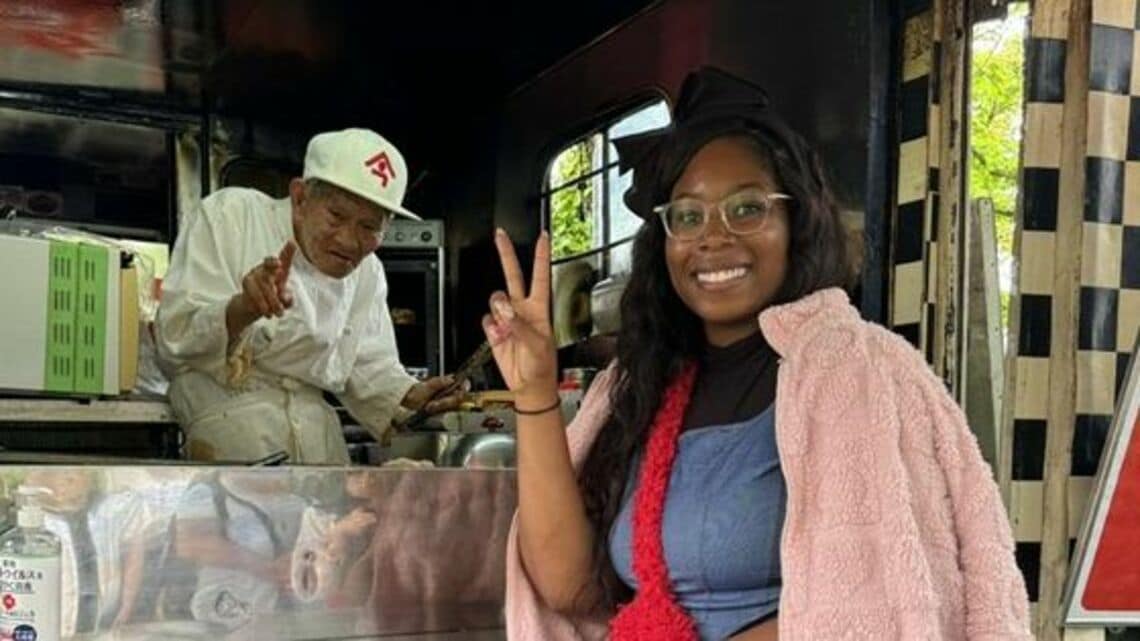
Amid growing interest in Japan’s soft power exports and its appeal to international audiences, creators like Kawaii Coco are subtly reshaping how the country is perceived abroad. Through bright visuals, candid storytelling, and cultural commentary, she’s not just promoting Japan—she’s helping redefine who gets to be seen as part of it.
When Kawaii Coco first came to Japan in 2021, she didn’t come with the intention of becoming a cultural ambassador. A 32-year-old from Winston-Salem, North Carolina, she recalls working in the Disney College Program, where one of her coworkers was really into Japanese culture. That friend eventually moved to Japan, and when Coco visited on vacation and saw her thriving—working, dating, living—it shifted her entire perspective. “I was so ignorant that foreigners could live in Japan,” she says. “Seeing her here made it real. It made it possible.”
That realization sparked what would grow into a singular career: connecting cultures through candor, content, and kawaii. Now a prominent creator on Instagram and TikTok, Coco showcases Japan to global audiences with humor, honesty, and heart, especially as a Black woman navigating life abroad.
At first, her videos were simply a way to keep family in the loop. But slowly, they began to resonate, particularly with Black women curious about Japan. “They’d message me like, ‘Wait, we can thrive there?’” she says. “That’s when I realized I was showing something they hadn’t really seen. And it was helping people.”
Her feed blends lifestyle updates, fashion hauls, and cultural insight, offering a version of Japan that feels intimate and relatable. Much of that connection stems from her vulnerability.
“I share the good and the bad—when I’m feeling down, when I miss home, when something’s hard,” she says. “It’s not all sushi and cherry blossoms. People appreciate that.” Her openness has drawn a loyal global following, many of whom say they feel more seen through her work than in traditional portrayals of Japan.
Coco is especially passionate about spotlighting the overlooked. “I want people to know you don’t have to fit a mold to belong here,” she says. “You can be curvy, you can be dark-skinned, you can be loud, you can wear bright-ass clothes—and you can still love and live in Japan. You can still belong.” Her message resonates not only with Black women abroad but with a broader audience drawn to her joy, honesty, and unapologetic style.
“Sometimes I meet girls who say, ‘I didn’t know someone who looks like me could do this,’” she says. “That gets me emotional, because that’s how I felt at first. I just try to be the example I wish I’d seen.” Her vibrant feed—full of color, candid joy, and truth—serves as both mirror and window: reflecting underrepresented viewers while offering others a fresh view into life as a foreigner in Japan.
But Coco doesn’t romanticize the challenges. People stare. They make assumptions, treat her like a novelty. “Sometimes it’s funny, but sometimes I be like, damn, again?” she says. Still, she doesn’t shrink. She leans in, using humor and self-assurance to reclaim space.
“I just do me. Laugh if you want, stare if you want. I’m not going anywhere.”
That confidence helped launch her career—literally. One early viral video featured a visit to a Tokyo bakery run by a Black man. She casually spotlighted his carrot cake and welcoming vibe. The video took off.
https://www.tiktok.com/@kawaiiicoco/video/7449555053767134507
“People really pulled up,” she laughs. “Came to Japan just for that carrot cake.”
The response was overwhelming. “I’ll be there in February!” one viewer wrote. “My fiancé and I are going for our honeymoon—we’ve got to check this out,” said another. It became a Tokyo must-visit, with one follower even returning after finding it closed the first time. What began as a lighthearted post became a moment of uplift, not just for Coco but for the baker, too.
“That’s when I realized this was bigger than me just having fun online,” she says.
Looking ahead, Coco wants to expand beyond content creation. “I want to do makeup that actually matches us, and clothes that fit and look good,” she says. “Japan needs that.” She's exploring fashion and beauty projects for communities often excluded—plus-sized women, people with darker skin tones.
“Japan has cute stuff, but not always in shades for us,” she says.
She’s also interested in fashion that embraces fuller bodies. “People think if you’re big, you can’t be stylish. I’m like—watch me.”
For Coco, representing Japan doesn’t mean ignoring its gaps—it means helping fill them. Her ambitions go beyond product lines. She dreams of helping reshape Japan’s view of difference: not as something to erase or assimilate, but something to celebrate.
“I want to be part of that change,” she says. “Not just for Black girls, but for anyone who’s ever felt like they don’t fit the mold.”
That’s the paradox Coco embodies—someone who loves Japan while also gently challenging it. Her presence is a quiet revolution: visibly different, unapologetically herself, and deeply rooted in affection for the place she now calls home.
“I always say: you don’t have to erase who you are to make room for others. You can expand without diluting. That’s real strength.”
As Japan wrestles with its place in an increasingly interconnected world, voices like Coco’s offer a glimpse of what’s possible: a society willing to embrace nuance, celebrate individuality, and welcome honest reflection. She may not have planned to be an ambassador, but that’s exactly what she’s become.
In a climate where debates over immigration and identity shape national discourse, Coco’s quiet presence online offers something profound: an alternative narrative rooted not in conflict, but in connection. Her story isn’t just about thriving abroad—it’s about expanding what belonging can look like in a country still defining its future.



